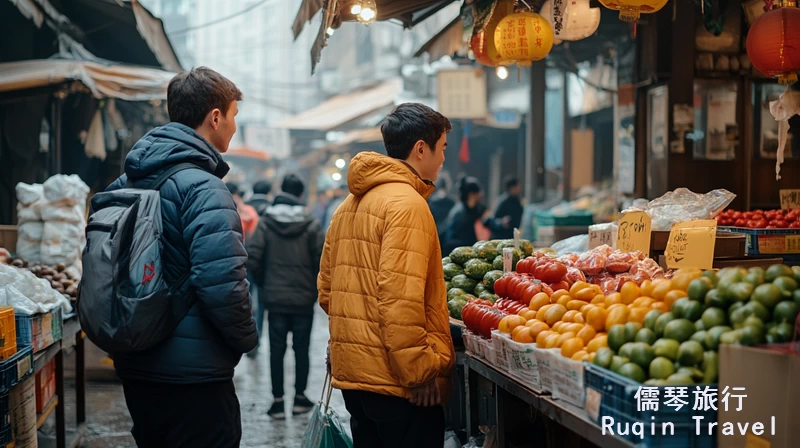Shopping and bargaining in China may be one of the most exciting experiences for foreign tourists traveling to China. The vibrant markets, unique goods, and the thrill of negotiation make it a must-do activity.
However, understanding how to navigate the shopping scene can be challenging. This guide aims to equip you with essential knowledge and practical tips, ensuring you have an enjoyable and successful shopping experience in China.
1. Understanding the Chinese Shopping Culture
Shopping Bargaining in China is more than just a transaction; it’s a cultural experience. Unlike in many Western countries, where prices are fixed, bargaining is a common practice in China, especially in street markets and small shops. However, department stores and branded outlets typically have fixed prices.
Chinese people often view shopping as a social activity. It’s common to see families and friends shopping together, enjoying the hustle and bustle of markets. Additionally, many markets operate late into the evening, providing a lively atmosphere for night shopping. Understanding this cultural context will help you appreciate the nuances of shopping in China.
2. Top Markets in China
China boasts a diverse range of markets, each offering unique goods and experiences. Beijing’s Silk Market is famous for its silk products, clothing, and accessories. Here, bargaining is expected, and it’s a great place to hone your negotiation skills. Shanghai’s Yuyuan Bazaar offers traditional Chinese crafts, jewelry, and souvenirs. The bazaar’s historic setting adds to the charm of shopping.
In Xi’an, the Muslim Quarter is known for its vibrant food markets and unique handicrafts. Meanwhile, Guangzhou’s Shangxiajiu Pedestrian Street is a hub for clothing, electronics, and local snacks. Lastly, Hong Kong’s Ladies’ Market is a haven for affordable fashion and trinkets. Each of these markets provides a unique glimpse into China’s shopping culture.
3. How to Bargain in China
Bargaining in China can be an art form. It’s essential to approach it with a positive attitude and a sense of humor. Start by asking for the price, then counteroffer with a lower amount. Typically, it’s safe to start at about half the asking price. The seller may respond with a counteroffer. The key is to remain friendly and polite, making the process enjoyable for both parties.
It’s also helpful to have a maximum price in mind before starting the negotiation. This way, you won’t feel pressured to pay more than you’re comfortable with. Additionally, using phrases like “太贵了” (tài guì le), meaning “too expensive,” can be useful. Remember, the goal is not just to get the lowest price but to enjoy the experience.
4. China Shopping Tips for Tourists
When shopping in China, there are several tips that can enhance your experience. First, always carry cash, as many smaller vendors may not accept credit cards. However, digital payment methods like Alipay and WeChat Pay are widely used, so consider setting these up if you’re staying in China for an extended period.
Next, familiarize yourself with the local currency, the Chinese Yuan (RMB). Understanding the value of the currency will help you gauge whether a price is reasonable. Additionally, always check the quality of items before purchasing, especially in markets where counterfeit goods can be common. If you’re unsure about the authenticity of a product, it’s best to avoid it.
5. Shopping Etiquette in China
Shopping etiquette in China can differ from what you might be used to. For instance, haggling is not only accepted but expected in many markets. However, it’s important to approach it with respect. Avoid being too aggressive, as this can be considered rude. Instead, focus on being friendly and respectful.
When handling money, use both hands to give and receive cash. This is a sign of respect in Chinese culture. Additionally, it’s polite to say “谢谢” (xièxiè), meaning “thank you,” after making a purchase. This small gesture can go a long way in creating a positive interaction with the vendor.
6. Where to Shop in China
China offers a wide range of shopping options, from bustling markets to high-end malls. In major cities like Beijing, Shanghai, and Shenzhen, you’ll find luxurious shopping centers with international brands. These malls often offer a more relaxed shopping experience with fixed prices and air-conditioned environments.
For a more local experience, street markets and small shops are the way to go. These places offer unique products, from traditional Chinese clothing to handmade crafts. If you’re looking for souvenirs, consider visiting markets in tourist areas, where you’ll find an array of items representing Chinese culture.
7. Buying Souvenirs in China
When buying souvenirs in China, you’ll find a variety of options. Popular choices include silk products, tea, calligraphy sets, and traditional Chinese clothing. Silk scarves and Chinese tea make great gifts for friends and family. Additionally, Chinese calligraphy brushes and ink sets are unique souvenirs that represent China’s rich cultural heritage.
When shopping for souvenirs, it’s essential to consider the quality of the items. For instance, if you’re buying tea, ask the vendor to let you sample it first. This way, you can ensure you’re getting a high-quality product. Similarly, when purchasing silk products, feel the fabric to check for softness and quality.
8. China Street Markets
China’s street markets are vibrant and bustling, offering a wide range of products. From fresh produce to clothing and electronics, these markets are a treasure trove of unique finds. Night markets are particularly popular, offering delicious street food and lively entertainment. These markets are perfect for experiencing local culture and trying out Chinese delicacies.
When shopping at street markets, it’s essential to be aware of your surroundings. Keep an eye on your belongings and be cautious of counterfeit products. Additionally, it’s a good idea to visit the market during daylight hours, as this can make it easier to inspect the quality of items.
9. Tips for Tourists Shopping in China
As a tourist, shopping in China can be both exciting and overwhelming. To make the most of your experience, it’s essential to be prepared. First, do some research on the markets and shops you plan to visit. Knowing what to expect can help you navigate the scene more effectively.
Additionally, don’t be afraid to ask for help. If you’re unsure about how to negotiate or what a fair price is, ask a local or consult online resources. Finally, always stay polite and respectful. Remember, shopping in China is not just about getting a good deal; it’s also about building positive interactions.
Shopping and bargaining in China can be an exhilarating experience for foreign tourists. The diverse markets, the thrill of negotiation, and the opportunity to explore unique products make it a must-do activity. By understanding the local culture, knowing where to shop, and mastering the art of bargaining, you can enjoy a seamless and enjoyable shopping experience.
Whether you’re hunting for souvenirs, exploring street markets, or browsing high-end malls, each shopping adventure in China offers a unique insight into the country’s rich culture and vibrant lifestyle. So, gear up, embrace the excitement, and happy shopping!



